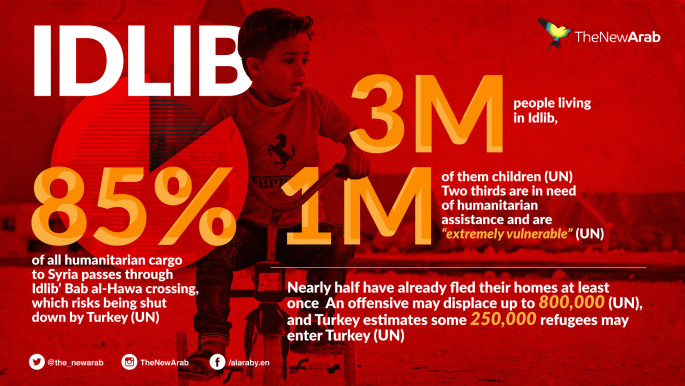'They are preparing to die': Aid groups say civilians preparing for the worst in Idlib
The Syria spokesman for Islamic Relief has blasted the international community for its inaction surrounding the 3 million civilians trapped in Idlib, northwestern Syria, saying they feel betrayed as they face an imminent and ruthless offensive.
Ahmed Mahmoud told The New Arab that airstrikes on Tuesday and Thursday have triggered a wave of displacement inside Idlib. This comes after a 22-day period of apprehensive calm in the last opposition-held territory left in Syria.
Idlib is extremely densely populated - the number of residents having swelled to more than double its pre-war size - as it has become the last remaining “safe haven” for internally displaced people from the rest of Syria, including southern and eastern regions from frontline areas toward the border with Turkey.
According to estimates, up to 700,000 people may be forced to flee over the coming weeks. Mahmoud says some people in Idlib have been displaced inside Syria four or even five times over the past few years.
However as people form an exodus away from the frontlines in western Idlib, the camps closest to the border with Turkey have become dangerously overcrowded, as Turkey has sealed its border and refused to receive any more refugees.
Essential services such as schools and hospitals are so overstretched that they simply won’t be able to cope with any escalation in fighting, Mahmoud said.
 |
When they speak about the situation they say they are prepared to die, that there’s nowhere else for them to go |  |
“There’s no electricity, no clean water, food shortages, prices of commodities are very high,” he said, adding that some people have no shelter and are sleeping under trees.
“Schools are full in the border areas, some classes have over 60 children in them,” he added.
Islamic Relief is trying to mobilise all its resources to this densely crowded border area. It will focus on providing emergency shelters, support for schools and healthcare facilities as well as emergency food supplies for the influx of people.
 |
| [Click to enlarge] |
Mahmoud emphasised that this is the exact same pattern that has played out repeatedly over the past seven years of the conflict. Airstrikes on Tuesday killed 17 people, six of them children, according to local news sources. They also destroyed a school. On Thursday, a hospital and civil defence centre were targeted by bombing, with the centre now forced to close.
"The civilian population and civilian infrastructure has been targeted time and again and people are being subjected to indiscriminate violence in order to force them to move," he says.
Islamic Relief calls on the parties involved in the conflict to respect international humanitarian law and international human rights law. Mahmoud says he calls on the international community to “leave no stone unturned” to find a solution for this “last safe haven” for Syrian civilians.
 |
People don’t care if it’s a chemical weapon or not, in the end, they’re dying regardless of the weapon used |  |
Speaking of the mood among those trapped in the besieged governorate, Mahmoud paints a bleak picture.
“When they speak about the situation they say they are prepared to die, that there’s nowhere else for them to go,” he said.
Mahmoud says civilians are criticising the international concern with chemical attacks: “When conventional weapons are used to kill hundreds and thousands of people, is this just a normal situation?” he said.
“People don’t care if it’s a chemical weapon or not, in the end, they’re dying regardless of the weapon used,” he added.
 |
| [Click to enlarge] |
“They feel betrayed by the whole world. There is a huge mistrust in the international community for not being able to prevent this tragedy from happening for the last seven years,” despite the same scenario being played out repeatedly on the international stage, he added.
Turkey, Russia and Iran are set to meet on Friday for discussions on the current situation, with Turkey resolute to stop further attacks on the opposition-held province.
Germany, whose foreign minister held a press conference along with his Turkish counterpart, is also concerned about the "looming humanitarian catastrophe".
"We will continue our efforts to prevent it. Turkey is possibly better prepared than others to weigh in on these developments," the German foreign minister said on Thursday.
Follow Florence Dixon on Twitter @flo_dix





 Follow the Middle East's top stories in English at The New Arab on Google News
Follow the Middle East's top stories in English at The New Arab on Google News


